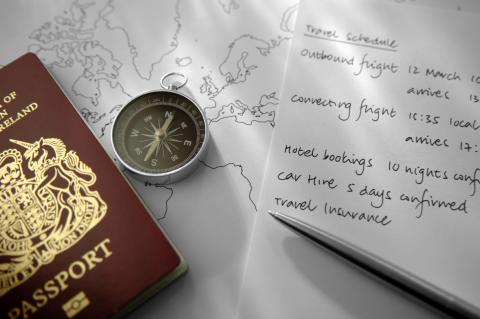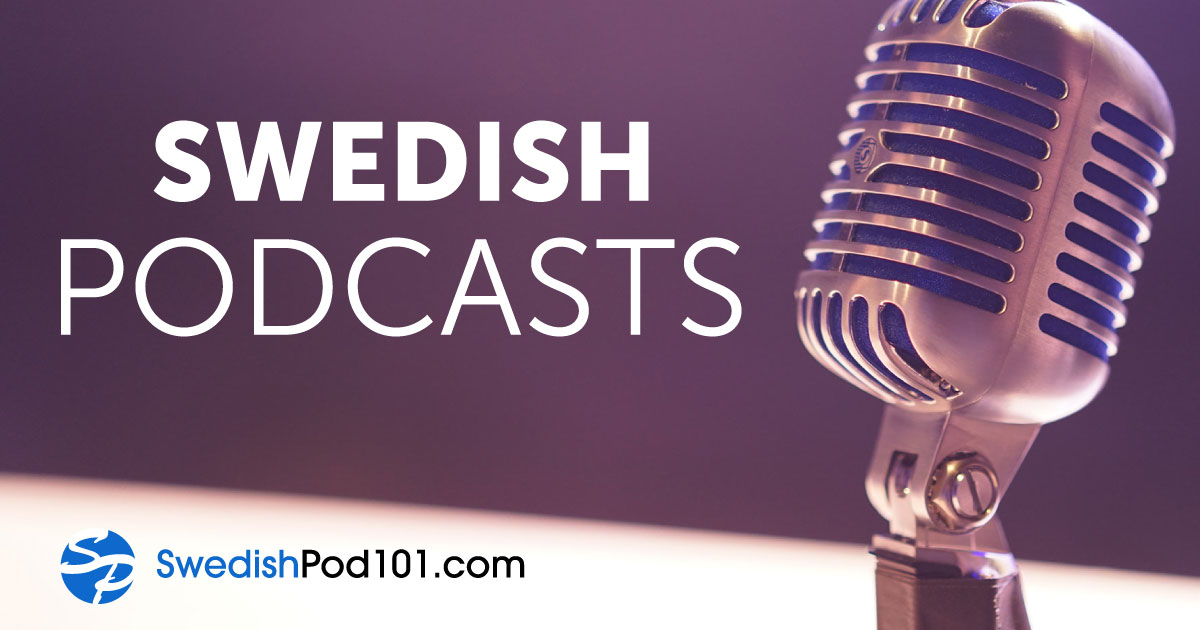
It’s no secret that Swedes speak English well.
But if you dropped in unexpectedly on a Swedish company’s conference call, you might be a little surprised to hear everyone speaking in English despite the fact that everyone working there was born and raised in-country.
What gives?
Shouldn’t they be speaking…Swedish?
Well, because of many different factors, there are quite a few modern colloquial English words in Swedish. They call this phenomenon “Swenglish,” and here’s what it’s all about.
 Table of Contents
Table of Contents
- Putting Swenglish in Context
- Examples of Swenglish
- English Loanwords
- What a Swedish Accent Sounds Like in English
- English Words Originally From Swedish
- Conclusion
Putting Swenglish in Context

First off, this name isn’t really fair. It’s taken from the German equivalent “Denglish,” which refers to German laced with far too many English loans. However, “Swenglish” is actually used to describe English with Swedish characteristics, which we’ll get to in a little bit.
But how did all this English get into the Swedish language in the first place?
Well, the Vikings invaded England in the early Middle Ages. But that’s not the whole story, as many of them stayed there and ended up influencing the English language instead.
You see, Swedish is a Northern Germanic language while English is a Western Germanic one. This means that many centuries ago, around the fifth century BC, there was one parent language that later split up due to migration patterns and natural language change.
That makes it easy to pull words from one language to the other, kind of like baking cookies from the same mold and putting them on different trays.
In the nineteenth and twentieth centuries, English started becoming more and more of a world language, and Swedes began facing greater pressure to learn it. By the twenty-first century, they had achieved that goal in spades. The vast majority of Swedish youth these days gain full mastery of English while still in high school.
Because English is of such great international importance and considered trendy to learn, it’s the perfect language to pull words from, even among Swedes speaking Swedish to each other. Plus, recent immigration and English-taught higher education efforts both point to a rising use of English in Sweden.
But some Swedes are pushing back, saying that it’s unnecessarily eroding a perfectly good language and culture. However, this kind of popularity-driven language transition is quite tough to ignore, and sooner or later English words will have entered Swedish for good.
Examples of Swenglish

So what does this “Swenglish” or “Svengelska” look like in real life?
‘Swenglish’ refers to English words that mean something else in Swedish, having been adopted into the language and undergoing changes over time. After all, when non-native speakers start using a foreign word in their own language, it can easily take on a life of its own. To give you an idea of what we mean, let’s look at several Swenglish examples.
We’ll start with the word “athlete.” In English, it refers to anyone who practices a sport and uses their body to enter competitions. In Swedish, though, it typically refers to “a bodybuilder,” or someone who sculpts their muscles for aesthetic reasons. The “pure” Swedish word for “athlete” would be friidrottare.
Another example is the word sejfa, which sounds an awful lot like the English word “safe.” This one actually means “to play it safe,” or in other words, to be careful when attempting something new.
If you’ve studied any German, you may be familiar with the false friend tränar, which is also used in Swedish. It’s not “to train” as you would train a dog or cat, but “to exercise.”
Have you ever done any winter sports in Sweden? Better try to avoid peaken: the “peak of the season,” distinct from a mountain peak, which would be topp or spets.
Some words seem like they should be English words from their look and sound, and many Swedes might even swear to you that they are—but you won’t find them in an English dictionary.
Such words include legitimation (otherwise known as an ID card) and hangarounds (supporters of a political movement). Finally, if you hear a Swede complimenting your backslick, your first instinct might be to turn around and see if something’s gotten spilled on your shirt. But in reality, it just means “slicked-back hair.”
English Loanwords

Now that we’ve seen some examples of words that are slowly becoming native Swedish, we should mention that there are also plenty of words that are clearly English (for the time being, at least). Many of these English words used in Swedish are ones you’d hear in science, technology, and business meetings. This is because they’ve simply become the preferred way for experts in these fields to communicate.
Words like midquarter report, pressrelease, call center, and all time high are extremely commonplace in big Swedish business firms—remember, the official language of many Swedish businesses is English to begin with!
Note that the spacing or hyphenation of the examples above might be a little different from what English-speaking countries mandate as the norm. This is intentional, as these words have been adopted into Swedish orthographic conventions instead of maintaining the English ones.
Although Swedish verbs don’t conjugate for person or number, you can still see the Swedish verb suffix on loanwords like chillar (“to chill out”) or mailar (“to send by email”).
This is where the Swedish linguistic purists start tearing their hair out, by the way. They feel that Swedish speakers should make an effort to come up with their own native-Swedish equivalents, much like the Mandarin and Icelandic languages do.
If that were the case, you’d see loans like design replaced by formgivning and food processor replaced by matberedare. Only a serious and widespread effort to get rid of English loans could stop the process at this point, and that’s not very likely to get underway.
By the way, here is a quick fun fact before we move on to the next section: the word präst (“priest”) is actually a loanword from English, not a common Germanic word that happened to stay roughly recognizable. Scholars believe it comes from the Middle Ages and/or Renaissance!
What a Swedish Accent Sounds Like in English

Unfortunately, there’s one extremely famous rendition of a “Swedish accent” permanently entrenched in the minds of Americans—the character of the Swedish Chef from the children’s show Sesame Street.
While not really crossing any line into “offensive,” this has been the basis of quite a few good-natured jokes toward Swedes living abroad, to the extent that it should probably be laid to rest at this point.
The reason why that stereotype is so enduring, though, is because there really is a distinctive rhythm to Swedish speech. This is because the Swedish language, like Norwegian, Japanese, and a handful of other European and Asian languages, has a “pitch accent.”
You can find a few other good resources about Swedish pitch accent online, but the gist of it is that each word in Swedish has either a rising or falling pitch pattern. To native speakers, pronouncing a word with a different pattern sounds understandable but odd.
And turnabout is fair play: when Swedes speak English, they often subconsciously apply the pitch rules of their own language to English, leading to that musical rhythm.
Other than that, the long exposure many Swedes have to the English language means that they tend to pick up even subtleties of the pronunciation quite well. It helps that most of the sounds in English exist in Swedish, more so than for French or German speakers!
English Words Originally From Swedish

Since Swedish has never been that big of a language, its cultural reach has always been rather small. Still, when you look carefully at English vocabulary, you can find some rather common English words from Swedish or other Scandinavian languages.
The hobby of “orienteering” comes from the Swedish orientering, explaining why this word doesn’t quite sound like an English word even though it’s spelled like one.
Fartleks, a type of exercise training for long-distance runners, comes from the Swedish words fart (“speed”) and lek (“play”).
The metal tungsten is a combination of the Swedish words meaning “heavy” and “stone.”
Finally, the ubiquitous European moped comes from a blend of words from 1950s Swedish: motor och pedaler (“motor and pedals”).
Apart from those, many words that English speakers take for granted when discussing history and literature actually come from Old Norse, and so are Swedish by proxy if you will. These include elf, troll, and saga.
Conclusion
Even if Swedes end up using Swenglish and English in equal measure in the future, it doesn’t mean that there’s no hope for the Swedish culture as a whole.
People were probably saying the same thing when Anglo-Saxon speakers started using Norse terms on the British Isles! All languages shift and change with time, and Swedish is no exception.
Fortunately, you don’t have to get hired at a Swedish company to start picking up how the language is really used today. SwedishPod101 has got you covered.
Once you attain a strong level in Swedish thanks to our audio podcasts, videos with transcripts, word lists, and other useful resources, it’ll be easy for you to pick up and maintain a healthy balance of languages in your personal and professional Swedish lives.
Try out SwedishPod101 today and enjoy adding another language to your repertoire!
How many of these words were you surprised to find on our list? Are there any we missed? Let us know in the comments!










